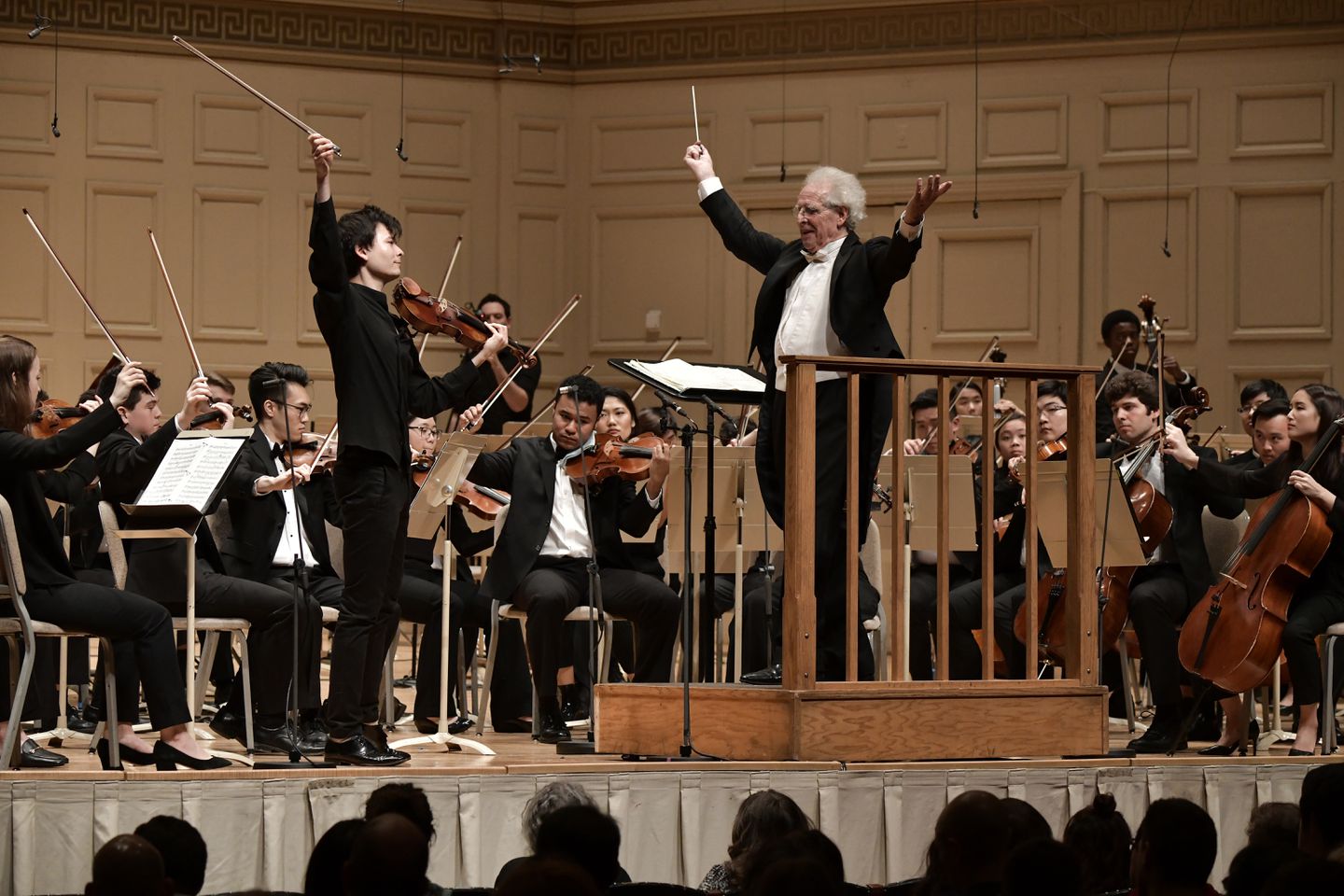Stefan Jackiw and Benjamin Zander return to the Mendelssohn Concerto, 20 years later

What makes a truly compelling violin soloist? Technical mastery is only the beginning of course. Such a player, wrote the great pedagogue Carl Flesch, must be more than a mere middleman, ferrying the music between composer and audience. The soloist must add his or her own “awareness and sensitivity” — a distinctive artistic personality that helps bring the music across the footlights. The soloist must, in short, have something truly important to say.
Then there is another koan with which a soloist must grapple: the outward projection of interiority. Playing for a hall of listeners does not always mean playing to them en masse. A concerto performance is not a circus or a political rally. The music itself has inner- and outer-directed moments, and the best performances savor them each in turn. Listeners are here in the hall, and not home on their devices, in order to feel these shifting valences, to be drawn in by what they hear, to follow those sounds somewhere new.
I was delighted for the many young musicians of Benjamin Zander’s youth orchestra to have had the opportunity to work with the violinist Stefan Jackiw this weekend. Jackiw grew up right here in Boston and those with long memories may recall his local performances at earlier stations of his own artistic journey. In fact, as a teenager, Jackiw played in the ensemble Zander then directed at New England Conservatory, the Youth Philharmonic Orchestra. Back then, the conductor asked Jackiw to perform as soloist in the Mendelssohn Violin Concerto and he did so in November 1999. This Sunday afternoon, almost exactly 20 years later, he returned to Zander’s current ensemble, the Boston Philharmonic Youth Orchestra, with the same work.
Since that first performance Jackiw, now 34, has grown to become one of the most insightful violinists of his generation. Every ambitious young fiddle player learns the Mendelssohn Concerto as a student, and the work, of course, is played often in concert, a bit too often, so it can be hard to make a distinctive impression with this particular score. Yet there was nothing routine or canned about Jackiw’s fiercely alert music-making on Sunday. Every phrase had its own distinctive shaping. Forward-leaning tempos in the outer movements conveyed a rhapsodic intensity. And Jackiw’s navigation of the work’s hurtling virtuoso runs demonstrated a more basic understanding, one that is shared by the finest singers when they navigate florid coloratura passagework: that these musical gymnastics are not ends in themselves — fireworks to wow the crowd — but an externalization and heightening of the expressive arc at the center of the music itself. They are only a means to an end. When they are played as the end in itself — as they often are — we feel the difference, whether we realize it or not, in the unity and depth of the performance, the places it is able to reach. In this case, Jackiw, simply put, made the music his own. And Zander and the orchestra were there to meet him at every turn.
As an encore Jackiw turned to the Largo from Bach’s C-Major Sonata, floating the music off the stage in a delicate and beautifully inward-drawing performance that bore out his own relationship to the koan mentioned above. Let’s hope Jackiw returns to Boston soon — both with the Boston Philharmonic’s ensembles but also with the Boston Symphony Orchestra. While he has played at Tanglewood with some frequency and appears with other major US orchestras, it’s been 17 years since his one and only BSO subscription appearance in Symphony Hall. It’s up for debate whether the BSO, on its prestigious subscription series, should be presenting any teenage players at such an early stage of their artistic journeys. But what shouldn’t be debatable is that those who have matured to the extent that Jackiw has should be invited back to Symphony Hall.
Speaking from the stage on Sunday, the violinist dedicated his encore to Zander and credited him for having influenced his path toward a life in music. He also thanked this tirelessly devoted conductor for inspiring so many young musicians over the generations.
That Zander is still doing just that was strikingly evident from the BPYO’s vibrant reading of Verdi’s Overture to “La Forza del Destino” that opened the program, and from the deeply committed, musically accomplished performance of Mahler’s First Symphony delivered after intermission. The third movement of the Mahler, with its haunting minor-key treatment of a children’s melody, landed to chilling effect, and the symphony’s vast finale built inexorably to the full exaltation of its final pages, with horns unseated and woodwinds raised toward the Mahlerian heavens.
“Once again Zander had drawn out the very best from these young players, and a delighted crowd in Symphony Hall made its gratitude seen and heard.”
See a Mendelssohn Interpretation Class
 Jeremy Eichler - The Boston Globe
Jeremy Eichler - The Boston Globe